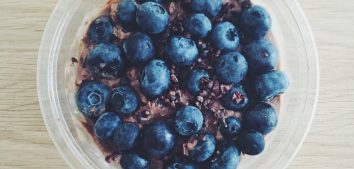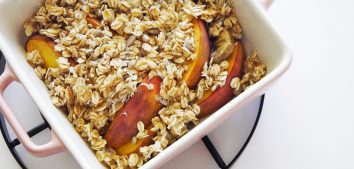
How to lose weight safely?
It is difficult to find a person who hasn’t tried to lose weight at least once in their life. Still, few people manage to achieve lasting results. Why? The limits you impose are often too strict, the expectations are too high, and you just don’t know what to do to make the slimming process effective and, above all, safe for your health. Today I will try to explain what to look for when starting the change process 🙂 Don’t forget about our #SmallSteps#BigChange challenge – this week we are focusing on introducing another habit: healthy dinners, i.e. the last meal of the day, which is also extremely important for an effective weight loss process.
Before you begin
The most important point is to build healthy habits that you will maintain throughout your life. Begin by making some basic changes to your lifestyle. If you haven’t done it yet, I encourage you to take part in the #SmallSteps#BigChange challenge, in which we focus on healthy habits. Every day I motivate you to introduce modifications to your routine, I try to inspire and suggest which things could be changed.
Here are some more tips!
Medical examination
Before you start the weight loss process, you should definitely visit your doctor and carry out basic laboratory tests: blood test including iron levels, hemoglobin, vitamin D and fasting blood sugar levels. It is also worth checking the concentration of free thyroid hormones, because its functioning significantly affects the metabolic processes in the body. If you want to take care of your health, you must be sure that the extra kilos are not the result of any disorders. If it turns out that you suffer from deficiencies of some nutrients, it is worth seeking help to supplement them for a correct and effective weight reduction process.
Drink water
Replace juices and sweetened drinks with water. It should cover most of the demand for liquids during the day, the remaining drinks should be just a supplement. A glass of sweetened drink is about 150 extra kcal! If you do not like clean water, you can add mint, several fruits (e.g. strawberries, frozen raspberries, slices of lemon, orange) to it, to enrich the taste. In addition to water, you can drink tea and herbal infusions (but without sugar!). Consume about 2 liters of fluid a day. If you take up physical activity, your demand for liquids may be higher (HERE I wrote about hydration during training). Remember to make up for the post-workout loss and to drink small amounts of water during exercise.

Eat meals at regular times
Yes, I know, you will think it is trivial … but it is really important! Try to eat about every 2.5 to 4 hours. Appropriate distribution of meals throughout the day will avoid hunger pangs, improve metabolic rate and help maintain normal blood glucose levels. It is worth creating a meal plan for the coming days, planning your purchases and preparing lunchboxes for work. Start with simple meals that don’t take too much time to prepare: yogurt with nuts and fruit, vegetable salad with any groats and roast chicken, a sandwich with good quality bread, fresh vegetables, the addition of healthy fat (vegetable oils or avocado) and protein (for example sliced roast chicken breast in herbs). You can find these recipes in my Diet & Training by Ann app 🙂
Remember about breakfast
Many studies indicate that people who do not eat breakfast eat more at subsequent meals. The first meal provides us with energy for the whole morning! Eating breakfast has a positive effect on concentration, the ability to remember, it prevents fluctuations in blood glucose over the day. Properly composed breakfast ensures satiety and helps avoid snacking. It should be consumed within an hour of waking up. You can find more about this HERE.
Limit sweets and fast food
Complete elimination of highly processed products can be difficult at first. Over time, however, taste buds get used to new flavors. A good alternative to ready-made sweets can be those that you make yourself. On my blog you will find a lot of inspiration for healthy sweets. You don’t have to give up your favorite products completely, but it’s worth keeping them to a minimum.
Eat more fruit and vegetables
Current dietary recommendations say that you should eat no less than 0.5 kg of vegetables and fruit per day, ¾ of which should be vegetables (preferably raw). Vegetables and fruit are a source of fiber, which has a positive effect on intestinal peristalsis and contains lots of valuable vitamins and minerals. They should be present at every meal!
Eating out
When you prepare meals by yourself, you are sure what ingredients and in what quantities you used to prepare them. However, there are special occasions when we eat out. Such situations can be a problem. On a positive note, more and more restaurants offer healthy dishes full of vegetables and fruit. In almost every cafe you will find healthy pastries without the addition of sugar or milk. It is worth checking the offer of a place before leaving your home to be sure that you will find there high-quality dishes prepared from fresh raw ingredients. Of course, I recommend Healthy Store by Ann 🙂
Diet catering – is this a good choice?
I often hear that someone would like to eat healthy, but there is no time to cook. Diet catering may be a good option in this case. By receiving a set of meals for the whole day, we are sure that we will eat meals with high nutritional value at the right time. In addition, the form of packaging of dishes easily allows you to take them to work or on a journey.

Physical activity
According to the latest Pyramid of Healthy Nutrition and Physical Activity, movement should form the basis of a healthy lifestyle. Exercise not only promotes weight loss, but also maintains muscle mass and improves mood. Scientific research indicates that the best effects of weight reduction are achieved by people using comprehensive strategies combining a healthy diet with regular physical activity. Aerobic activity is a good choice for people who want to lose weight , for example: intense walking, running, swimming, cycling; supplemented with strength exercises (conducive to maintaining muscle mass).
Dinner – to eat or not to eat?
We talk a lot about the role of a wholesome breakfast which should help us kick-start out day. However, you must not forget about the other meals, including dinner. You should eat the last meal at least 2-3 hours before bedtime, so as not to burden your digestive system and allow it to regenerate and rest during sleep. It is worth paying attention not only to the timing, but also to the quality of the dinner. Give up highly processed products, dishes rich in unhealthy fats. For example, opt for a light salad with chicken and lots of vegetables. If you need recipes, check out my blog HERE. Also, follow my Instagram account as this week there will be a lot of important content about dinner, and I will be trying to dispel your doubts and bust myths surrounding this issue.
Stress – the ever present enemy of weight loss
Stress is an important factor involved in the development of overweight and obesity. It happens that negative emotions cause an excessive need to eat foods, especially those undesirable in healthy nutrition (rich in saturated fats and simple sugars). Bad feelings may be misinterpreted as hunger. As a result, instead of releasing accumulating internal tension, we eat to manage sadness and nerves. Complete escape from stress is not possible, but you can try to alleviate its negative effects. A good idea can be any form of physical activity that you find enjoyable, such as rest with family and friends, or time allocated to your passions and hobbies. It is worth spending at least a few minutes a day on your favorite activities: cooking, reading a good book, or maybe cleaning? The choice is yours:)
How to control your progress?
Your goal should not only be the disappearing kilograms. Remember that body weight is subject to daily fluctuations (up to 2 kg!), so don’t check your weight more than once a week (preferably in the morning, on an empty stomach). In addition, it is worth taking measurements of body circumferences: shoulder, waist, abdomen, hips or thighs. Sometimes, despite the lack of weight loss, your measurements can change for the better. This indicates changes in the composition of the body: body fat decreases, and the content of muscle mass increases (which is a natural effect of training). Tracking your measurements allows you to check your progress regularly.
Women should not check weight a few days before and during menstruation. Hormonal changes associated with the menstrual cycle affect water retention, which usually results in increased weight. Remember, however, that this is a natural process. A few days after menstruation, body weight should return to the baseline.
Training, diet and regeneration – or time for rest and sleep
According to scientific studies, insufficient sleep can increase appetite by increasing the concentration of hormones responsible for appetite regulation, which makes it more difficult to maintain a healthy diet. In addition, too short sleep is associated with a higher risk of developing cardiovascular disease, type 2 diabetes and metabolic syndrome. The optimal amount of sleep is 7 to 8 hours a day. However, sleeping longer than 9 hours is also not recommended. In addition to the length of sleep, its quality is also important. It is worth making sure that there aren’t any unnecessary light sources, that the room is quiet, and that we do not use light emitting devices (cell phone, laptop, TV) an hour before bedtime. Sleep hygiene is an important aspect of a healthy lifestyle that you cannot leave aside.
It’s time to… START!
Finally, the most important question: when is the right time to start? Now! It is not worth putting off everything until tomorrow, Monday, a new month. You can make changes gradually: from today try to drink more water, and next week take care of nutritious breakfasts consumed every day. It’s almost spring, and with it more and more sunshine, which brings lots of positive energy. Take advantage of this moment!
If you need help, I encourage you to use the Diet & Training by Ann application. Everything you need to achieve your goal is there. You’ll find recipes for balanced, tasty, and healthy meals. In addition, you can choose workouts for different body parts adjusted to your exercise capacity.
The most important thing is for this healthy lifestyle to become your everyday life, not your next sacrifice. Only in this way will you achieve lasting results. And remember not to give up. The real strength is not being perfect, but the ability to survive crises that we all go through.
I keep my fingers crossed for you ! 🙂
BIBLIOGRAPHY:
- Betts JA, Chowdhury EA, Gonzalez JT, Richardson JD, Tsintzas K, Thompson D. Is breakfast the most important meal of the day? Proc Nutr Soc. 2016; 75(4): 464-474.
- Kłósek P. Zależności między stresem psychologicznym a powstawaniem otyłości. Forum Medycyny Rodzinnej. 2016; 10(3): 145–152.
- Krajewska O, Skrypnik K, Kręgielska-Narożna M, Suliburska J, Bogdański P. Wpływ długości i jakości snu na parametry antropometryczne, metaboliczne i ogólny stan zdrowia fizycznego i psychicznego. Forum Zaburzeń Metabolicznych. 2017; 8(2): 47-55.
- Ramage S, Farmer A, Eccles KA, McCargar L. Healthy strategies for successful weight loss and weight maintenance: a systematic review. Appl Physiol Nutr Metab. 2014; 39(1): 1-20.
- Wiciński M, Niedzwiecki P, Soroko A, Ciemna K, Malinowski B, Grześk E, Stolarek W, Grześk G. Rola aktywności ruchowej oraz utraty masy ciała na przykładzie wybranych jednostek chorobowych. Współczesne kierunki działań prozdrowotnych. 2015; 83-93.










Comments No Comments
Join the discussion…